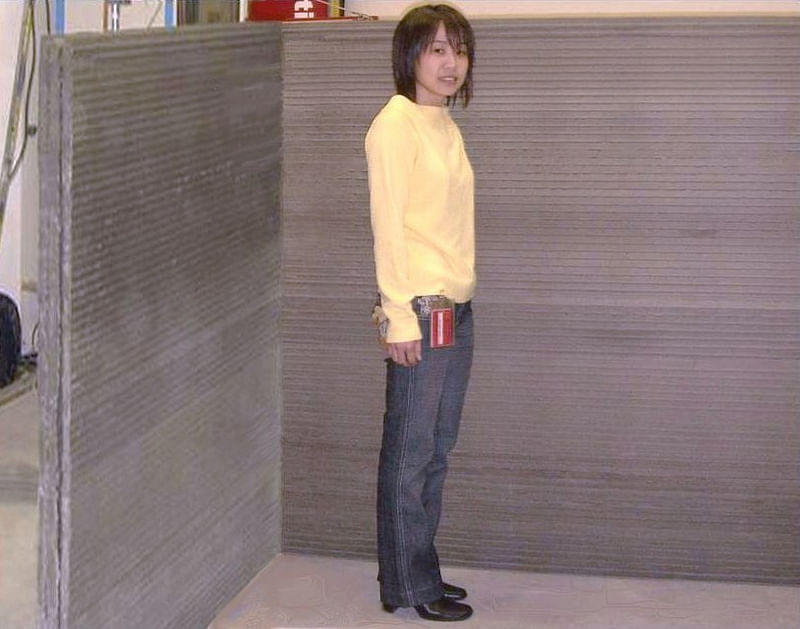"Contour Crafting" 3D-print constructor wins NASA Tech Briefs' Create the Future Design Contest 2014
By Bustler Editors|
Tuesday, Oct 7, 2014

Related
"Robotic Building Construction by Contour Crafting" by educator Behrokh Khoshnevis of the University of Southern California was named the grand prize winner of the Create the Future Design Contest for 2014. Launched in 2002 by the NASA Tech Briefs magazine publishers, the contest was created to encourage and honor innovation from engineers, students, and entrepreneurs worldwide.
Contour Crafting (CC) has received attention for its ability to 3D-print complete large-scale structures. In reducing time and cost of construction, CC could also be another potential solution for, say, reliable emergency housing in a post-disaster situation.
The grand prize includes $20,000 USD and a feature in a special supplement to NASA Tech Briefs magazine's November 2014 issue. The 2014 winners also included 7 First Prize category winners, 10 Popular Vote Prizes, and Top 100 Entries. (Listed here.)
Top prize winners will be invited to a special awards reception and dinner in New York City.
Read on to learn more about the grand prize winner.
"Contour Crafting (CC) is a computerized construction method that 3D Prints large-scale structures directly from architectural CAD models. Walls are built up by forming their outer surfaces via extrusion of a paste-like material, such as concrete, and the use of a robotic trowel to provide a smooth contoured surface. CC is a very flexible technique, capable of constructing aesthetically pleasing “organic” curvilinear shapes as easily as “boxy” rectilinear shapes; and, as such, it has attracted strong interest from leading architects.
Contour Crafting is a major innovation that automates the construction of whole structures; and radically reduces the time and cost of construction. The result would be a revolution in the construction industry that would lead to affordable construction of high quality low-income housing; the rapid construction of emergency shelters and on-demand housing in response to disasters. Contour Crafting is the first and only large-scale 3D printing technology that can rapidly construct complete buildings."

"The Contour Crafting technology has the following unique features:
- Reduces construction cost to about 30% of current cost
- Speeds up the construction process by a factor of at least 50
- Reduces construction injuries and fatalities (400,000 and 6,000 per year, respectively, in the US and more severe in developing countries
- Provides emergency shelter to the more than 37 million annual victims of war and natural disaster
- Provides dignified housing to the low income population of the world
- Contour Crafting eliminates construction wastes as the computer precisely adds material where it is needed.
- Dramatically reduces construction energy usage (by 90%) and CO2 emission (by 70%)
- Promises limitless architectural features such as curved walls
- CC is ideal for Lunar and Martian construction using in-situ resources.
During the last decade and under academic grants we have demonstrated the feasibility of the concept and currently have a system that can build 400 sq. ft structures with solid core or corrugated core walls. Within two years, with sufficient investment, it should be possible to demonstrate 24 hour automated construction of a full 2500 sq. ft structure. We will build a light weight machine that will be easily deployable."

"The optimal outcomes will be at short term and long term levels. In the short term, successful testing of the specimen structures built by the technology such that they outperform alternative manual on-site and prefab construction methods (wood frame, brick, concrete, etc.) will be ideal. Various performance criteria such as strength, cost, speed, waste, energy consumption, thermal insulation, weight, etc. will be measured by standard techniques (such as compressive and tensile strength testing, life cycle analysis, cost analysis, etc.)
The ultimate long term outcome is the revolutionizing of the construction industry. As for demand, according to the UN there is a worldwide shortage of 800M houses. Massive construction of low income housing around the world, rapid response to large scale disasters by providing dignified shelters, significant positive impact on environment and energy shortage are some of the impacts of CC."

Share
0 Comments
Comment as :